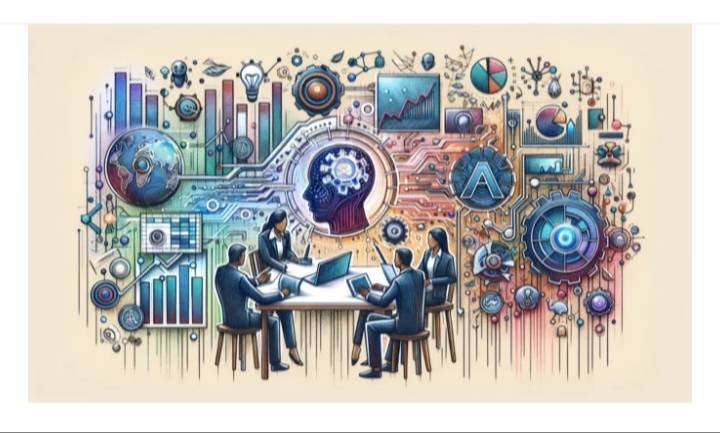
2025-02-18 01:53
IndustriaThe economics of artificial intelligence
#firstdealofthenewyearastylz
The economics of artificial intelligence (AI) is a rapidly evolving field that explores the impact of AI on economic growth, productivity, and employment.
*Key Economic Benefits of AI:*
1. *Increased Productivity*: AI can automate routine and repetitive tasks, freeing up human workers to focus on higher-value tasks that require creativity, problem-solving, and innovation.
2. *Improved Efficiency*: AI can optimize business processes, reduce waste, and improve decision-making, leading to cost savings and increased competitiveness.
3. *Enhanced Innovation*: AI can enable new products, services, and business models, driving innovation and economic growth.
4. *Job Creation*: While AI may automate some jobs, it may also create new job opportunities in fields like AI development, deployment, and maintenance.
*Key Economic Challenges of AI:*
1. *Job Displacement*: AI may displace certain jobs, particularly those that involve routine or repetitive tasks.
2. *Inequality*: The benefits of AI may accrue to a small group of highly skilled workers, exacerbating income inequality.
3. *Bias and Fairness*: AI systems can perpetuate existing biases and discriminate against certain groups, raising concerns about fairness and equity.
4. *Regulatory Challenges*: The rapid development and deployment of AI raise regulatory challenges, particularly in areas like data protection, privacy, and accountability.
*Economic Sectors Most Impacted by AI:*
1. *Manufacturing*: AI can optimize production processes, improve product quality, and reduce waste.
2. *Healthcare*: AI can improve diagnosis, treatment, and patient outcomes, while also reducing healthcare costs.
3. *Transportation*: AI can enable autonomous vehicles, improve traffic management, and reduce transportation costs.
4. *Finance*: AI can improve risk management, credit scoring, and portfolio optimization, while also reducing financial transaction costs.
*Policy Recommendations:*
1. *Invest in Education and Training*: Governments should invest in education and training programs that help workers develop the skills needed to work with AI.
2. *Encourage Innovation*: Governments should encourage innovation by providing funding for AI research and development, and by creating tax incentives for AI startups.
3. *Address Job Displacement*: Governments should implement policies to address job displacement, such as universal basic income, retraining programs, and social safety nets.
4. *Establish Regulatory Frameworks*: Governments should establish regulatory frameworks that ensure AI systems are transparent, explainable, and fair.
Me gusta 0
Nicky bella
ブローカー
Contenido delicado
Industria
Trabajo de WikiFX
Industria
Trabajo a tiempo parcial
Industria
gana sin invertir solo por usar una app
Industria
Evento de subsidio en México
Industria
gana 100 dólares con un minimo de inversión de 4 dólares
Industria
Evento de subsidio de Colombia
Categoría del foro

Plataforma

Exposición

Agente

Contratación

EA

Industria

Mercado

Índice
The economics of artificial intelligence
 Hong Kong | 2025-02-18 01:53
Hong Kong | 2025-02-18 01:53#firstdealofthenewyearastylz
The economics of artificial intelligence (AI) is a rapidly evolving field that explores the impact of AI on economic growth, productivity, and employment.
*Key Economic Benefits of AI:*
1. *Increased Productivity*: AI can automate routine and repetitive tasks, freeing up human workers to focus on higher-value tasks that require creativity, problem-solving, and innovation.
2. *Improved Efficiency*: AI can optimize business processes, reduce waste, and improve decision-making, leading to cost savings and increased competitiveness.
3. *Enhanced Innovation*: AI can enable new products, services, and business models, driving innovation and economic growth.
4. *Job Creation*: While AI may automate some jobs, it may also create new job opportunities in fields like AI development, deployment, and maintenance.
*Key Economic Challenges of AI:*
1. *Job Displacement*: AI may displace certain jobs, particularly those that involve routine or repetitive tasks.
2. *Inequality*: The benefits of AI may accrue to a small group of highly skilled workers, exacerbating income inequality.
3. *Bias and Fairness*: AI systems can perpetuate existing biases and discriminate against certain groups, raising concerns about fairness and equity.
4. *Regulatory Challenges*: The rapid development and deployment of AI raise regulatory challenges, particularly in areas like data protection, privacy, and accountability.
*Economic Sectors Most Impacted by AI:*
1. *Manufacturing*: AI can optimize production processes, improve product quality, and reduce waste.
2. *Healthcare*: AI can improve diagnosis, treatment, and patient outcomes, while also reducing healthcare costs.
3. *Transportation*: AI can enable autonomous vehicles, improve traffic management, and reduce transportation costs.
4. *Finance*: AI can improve risk management, credit scoring, and portfolio optimization, while also reducing financial transaction costs.
*Policy Recommendations:*
1. *Invest in Education and Training*: Governments should invest in education and training programs that help workers develop the skills needed to work with AI.
2. *Encourage Innovation*: Governments should encourage innovation by providing funding for AI research and development, and by creating tax incentives for AI startups.
3. *Address Job Displacement*: Governments should implement policies to address job displacement, such as universal basic income, retraining programs, and social safety nets.
4. *Establish Regulatory Frameworks*: Governments should establish regulatory frameworks that ensure AI systems are transparent, explainable, and fair.
Me gusta 0
Yo también quiero comentar.
Enviar
0Comentarios

No hay comentarios todavía. Haz el primero.

Enviar
No hay comentarios todavía. Haz el primero.